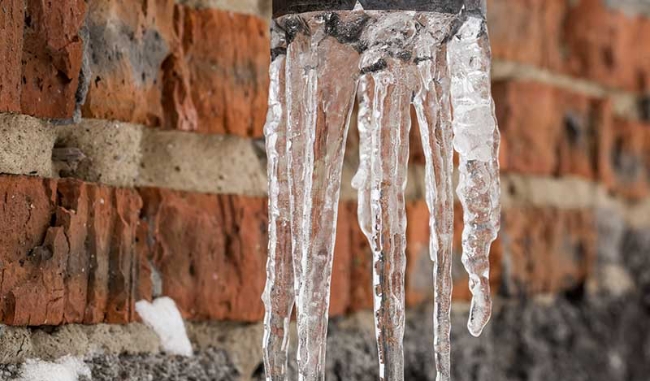Crucial Tips for Preventing Frozen Plumbing in Winter Conditions
Crucial Tips for Preventing Frozen Plumbing in Winter Conditions
Blog Article
On this page down the page you will find a bunch of high-quality insights involving Winter Plumbing Precautions: Preventing Frozen Pipes.

Winter can wreak havoc on your pipes, especially by freezing pipelines. Right here's how to avoid it from happening and what to do if it does.
Introduction
As temperature levels drop, the threat of icy pipes boosts, possibly resulting in pricey repairs and water damage. Recognizing exactly how to prevent icy pipelines is crucial for home owners in cold environments.
Avoidance Tips
Insulating prone pipelines
Wrap pipelines in insulation sleeves or utilize warmth tape to secure them from freezing temperature levels. Concentrate on pipelines in unheated or external locations of the home.
Heating techniques
Keep indoor spaces effectively warmed, particularly areas with plumbing. Open up cupboard doors to allow cozy air to distribute around pipes under sinks.
Just how to recognize frozen pipelines
Seek reduced water flow from taps, unusual smells or noises from pipelines, and visible frost on subjected pipes.
Long-Term Solutions
Architectural changes
Take into consideration rerouting pipes away from outside wall surfaces or unheated areas. Add added insulation to attics, basements, and crawl spaces.
Upgrading insulation
Buy top quality insulation for pipes, attics, and walls. Correct insulation aids preserve consistent temperature levels and decreases the risk of frozen pipes.
Safeguarding Outdoor Plumbing
Yard hose pipes and outside taps
Separate and drain pipes garden hose pipes before winter. Mount frost-proof faucets or cover outside faucets with shielded caps.
Recognizing Frozen Pipelines
What triggers pipes to ice up?
Pipes ice up when exposed to temperature levels below 32 ° F (0 ° C) for expanded periods. As water inside the pipelines freezes, it broadens, putting pressure on the pipe wall surfaces and potentially triggering them to burst.
Dangers and problems
Icy pipes can cause water supply interruptions, home damages, and pricey repair work. Burst pipes can flood homes and trigger comprehensive structural damage.
Indications of Frozen Water Lines
Recognizing icy pipes early can avoid them from rupturing.
What to Do If Your Pipes Freeze
Immediate actions to take
If you suspect icy pipes, keep taps available to ease stress as the ice thaws. Use a hairdryer or towels soaked in warm water to thaw pipelines gradually.
Conclusion
Stopping icy pipes requires aggressive procedures and quick feedbacks. By comprehending the reasons, indications, and safety nets, property owners can protect their plumbing throughout cold weather.
Helpful Tips to Prevent Frozen Pipes this Winter
UNDERSTANDING THE BASICS: WHY PIPES FREEZE AND WHY IT’S A PROBLEM
Water freezing inside pipes is common during the winter months, but understanding why pipes freeze, and the potential problems it can cause is crucial in preventing such incidents. This section will delve into the basics of why pipes freeze and the associated problems that may arise.
THE SCIENCE BEHIND FROZEN PIPES
When water reaches freezing temperatures, it undergoes a physical transformation and solidifies into ice. This expansion of water as it freezes is the primary reason pipes can burst. As the water inside the pipe freezes, it expands, creating immense pressure on the walls. If the pressure becomes too great, the pipe can crack or rupture, leading to leaks and water damage.
FACTORS THAT CONTRIBUTE TO PIPE FREEZING
Low Temperatures: Extremely cold weather, especially below freezing, increases the risk of pipes freezing. Uninsulated or Poorly Insulated Pipes: Pipes located in unheated areas, such as basements, crawl spaces, or attics, are more prone to freezing. Insufficient insulation or lack of insulation altogether exacerbates the problem. Exterior Wall Exposure: Pipes running along exterior walls are susceptible to freezing as they encounter colder temperatures outside. Lack of Heating or Temperature Regulation: Inadequate heating or inconsistent temperature control in your home can contribute to frozen pipes. PROBLEMS CAUSED BY FROZEN PIPES
- Pipe Bursting: As mentioned earlier, the expansion of water as it freezes can cause pipes to burst, resulting in significant water damage.
- Water Damage: When pipes burst, it can lead to flooding and water damage to your property, including walls, ceilings, flooring, and personal belongings.
- Structural Damage: Prolonged exposure to water from burst pipes can compromise the structural integrity of your home, leading to costly repairs.
- Mold and Mildew Growth: Excess moisture from water damage can create a favorable environment for mold and mildew growth, posing health risks to occupants.
- Disrupted Water Supply: Frozen pipes can also result in a complete or partial loss of water supply until the issue is resolved.
WHY CERTAIN PIPES ARE MORE PRONE TO FREEZING
- Location: Pipes located in unheated or poorly insulated areas, such as basements, crawl spaces, attics, or exterior walls, are at higher risk of freezing.
- Exterior Pipes: Outdoor pipes, such as those used for irrigation or exposed plumbing, are particularly vulnerable to freezing as they are directly exposed to the elements.
- Supply Lines: Pipes that carry water from the main water supply into your home, including the main water line, are critical to protect as freezing in these lines can affect your entire plumbing system.
- Underground Pipes: Pipes buried underground, such as those connected to sprinkler systems or outdoor faucets, can be susceptible to freezing if not properly insulated.
https://busybusy.com/blog/helpful-tips-to-prevent-frozen-pipes-this-winter/

I stumbled upon that review about Helpful Tips to Prevent Frozen Pipes this Winter while exploring the web. Please take the opportunity to share this entry if you enjoyed it. We enjoy reading our article about Winter Plumbing Precautions: Preventing Frozen Pipes.
Schedule Now Report this page